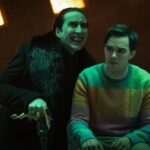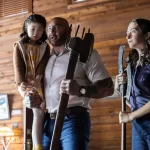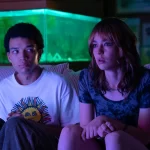Simple Pleasures of The Present: in water, In Our Day, Perfect Days, Anselm (AFI Fest 2023), by Scott Nye
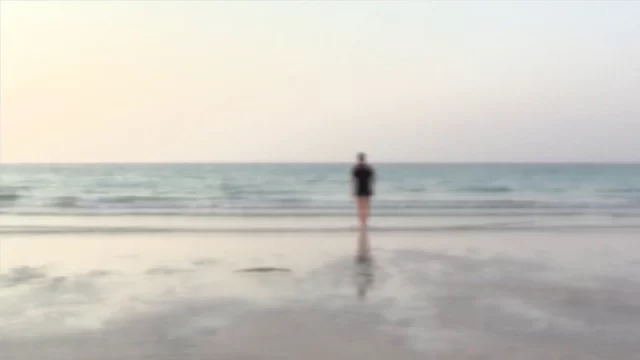
While his output could hardly be said to have slowed (aside from taking a year off in 2019 for the first time since 2007), it’d been six years since AFI Fest hosted two Hong Sang-soo films in the same festival. Since those films – Claire’s Camera and The Day After – Hong’s films have undergone a quiet, but to his devoted audience quite profound, revolution. He now acts not only as his own writer/director/producer, but also composer, editor, and cinematographer (his credit screen, acknowledging all six roles at once, draws a reliable laugh each time). His films have become much less about repetitive scenes and the way minor deviations define our lives, and much freer, more responsive to the act of their own production, and despite involving less and less sex and nudity since he started making films, in a sense, they are now more intimate. He’s even used, on occasion, a handheld camera.
in water and In Our Day, his two 2023 features, premiered three months apart, at the Berlin and Cannes Film Festivals, respectively. If they are distinct from one another, which I believe they are, and from his filmography altogether, which I would also contend, it is in no small part because in water (as the title has been stylized) especially is quite unlike any other film I believe I’ve ever seen, for a quite simple reason – the vast majority of it is shot out of focus.
It takes some time to adjust. The human eye is accustomed to seeking focal points, and I felt my eyes straining at first in an effort to draw its blurry images into clarity. It took a bit of training and effort to let them relax into accepting what we’re seeing. With the admission that I have not seen eight of Hong’s earliest films, in water is almost certainly his most overtly experimental effort.
Helpfully, he has at least used for this one of his simplest plots (“and that’s saying something!” yes, yes, yes). Seongmo (Shin Seokho) is an actor pouring his own money into a feature he will direct. His friend, Namhee (Kim Seungyun), will star, and his former classmate, Sangguk (Ha Seongguk) will shoot it. He just needs to decide what happens in it. This isn’t unusual territory in and of itself – Hong himself makes films by writing as he goes – but is absolutely a big swing for a first-time director calling on his friends for assistance.
So he spends most of his time looking around neighborhoods for what suits him visually, talking to locals, inquiring about real estate and trash gathering, and figuring out if any of it will fit into his film. The attraction is the experiment, and the experiment is lovely. While one loses, naturally, some of the minute behavior from his actors that often garner his biggest laughs, the effect is quite like seeing a Monet painting in motion. The film was shot at beachside location, so the clear separation of water and sand, the rocky cliffs, and the vast horizon all make perfect subjects for his approach (I have a harder time imagining this working in his typical concrete locations), with distinct colors and natural beauty pouring through the screen, bleeding into his actors, and reacquainting us with the pleasure of things that may have grown familiar.
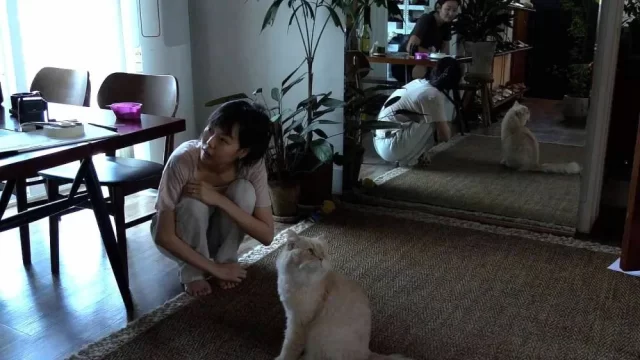
Familiar pleasures also drive In Our Day, a diptych film with two parallel stories that suggest some overlap without insisting on it. In one, Sang-won (Kim Minhee), a former actress, is enjoying some time off with her friend Jung-soo (Song Sunmi); in the second, a student, Ki-joo (Kim Seung-yun) is filming poet Ui-ju (Ki Joo-bong) for a documentary on his life and work. Both pairs have a degree of intimacy and friendliness (Ui-ju later refers to Ki-joo as his adopted daughter, though it seems to be more figurative) that is interrupted by young inquisitors. For Sangwon and Jung-soo, it’s her cousin Ji-soo (Park Miso), an aspiring actress. Ui-ju is also visited by an aspiring actor, Jae-won (Ha Seong-guk). Both have a lot of questions they are unable to articulate. Sang-won and Ji-soo are interrupted when Jung-soo’s beloved cat Us goes missing, which sets the cousins on a sort of abstract separation, while Ui-ju takes refuge in alcoholic distractions, despite his doctor’s warning that he should abstain.
In Our Day is a funnier and more superficially familiar Hong film, though it is markedly less visually appealing than anything he’s made, with very dim lighting and low-res imagery (the scattered reports that he made in water the way he did due to his failing eyesight comes to mind). There are misunderstandings, dialogue is repeated back to the people who said it, and by the end, a great deal of alcohol fuels a conversation. There’s an adorable, large, very furry cat named Us, which in accordance with the “Our” in the title suggests the cat has more say over the events than we might suspect…or is it the dog named “Us” that Ji-soo talks of? The emphasis on soaking in life as it comes, though, and finding pleasure where you can, has been a major theme he’s given more and more emphasis to since Hotel by the River, and which here finds its more ecstatic fruition. Both tales end with rather simple moments of having it all when you don’t know what else you have.
Where Hong Sang-soo has been working steadily in much the same mode for decades, yet finding endless variations therein, Wim Wenders has sought more traditional avenues of diversifying his filmography. He has worked in documentary, fiction, music videos, and commercials. He has made films in at least a dozen countries; three in 3D. Nevertheless, much like Hong, he exits 2023 with two new films that are each – in very distinct ways – about the immediate pleasures in life, and how they are enhanced by good work.
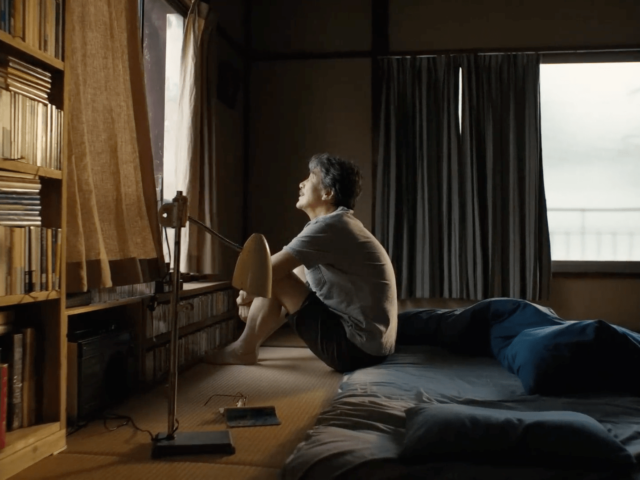
Perfect Days is Wenders’s most acclaimed film since his 2011 documentary Pina and most acclaimed narrative feature in I-don’t-even-know-how-long. It’s easy to understand why. Kōji Yakusho (13 Assassins, The Third Murder) stars as Hirayama, a toilet cleaner in Tokyo. See, Tokyo is one of those civilized places with rampant public toilets that you don’t need to enter a commercial space to use. Hirayama is very good at his job, and has a reasonably good demeanor, but doesn’t talk much. His younger coworker, Takashi (Tokio Emoto) often teases him about both. Why put so much into such a bad job, he wonders?
Hirayama doesn’t say. He works. He takes pictures when things catch his eye. He listens to American rock music from the 1970s. He tends to his plants. He has a routine and seems to derive some degree of satisfaction from it. He is a bit of a man out of time – the pictures are on a 35mm roll of film that he deposits regularly; the music is on cassettes that are now, much to his amazement, worth a fortune. They’re worth more to him if he can listen to them.
After a very pleasant and steadily-paced hour or so, the film’s second half disrupts Hirayama’s routine, and by extension ours, by giving us a bit of context for his younger life, his wider social sphere, and the precarious nature of his type of employment. Hirayama doesn’t make any major changes through the course of this film. It isn’t that type of film. But the film does leave us with the question as to whether his routine – his perfect days – are as fulfilling as they first suggested, or if this is a suggestion he’s making himself believe.
Those who know Wenders and his affinity for Yasujiro Ozu will sense an influence that’s inescapable to at least consider, but the particulars of his execution here are completely distinct, and more in line with the kind of films that he made his name on – isolated people who drive a lot, who wander around anonymous urban areas having conversations and interactions that make them appreciate or more fully understand themselves.
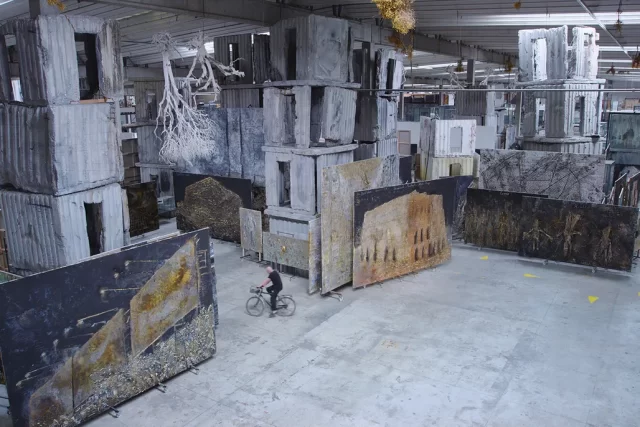
The titular subject of Wenders’s latest 3D documentary, Anselm, seems not at all to seek or need to question himself. Anselm Kiefer is one of the most renowned and successful artists in the world, with works in many more cities than Wenders has filmed and a place among the 1,000 richest people in Germany. As Wenders introduces us to him, he is pushing a gigantic piece of art around his studio, which seems to be the size of an airplane hanger, and which he chiefly navigates by bicycle. The film’s way into his world is at once semi-routine (we see him at work on new pieces, for example) and deeply unusual (said work involves taking a blowtorch to his canvas). That’s to say nothing of the sequences dramatizing his life as a child (played by Anton Wenders) and young man (Daniel Kiefer), nor the passages citing poetry by Paul Celan, whose work exploring the legacy and trauma of the Holocaust greatly influenced Kiefer, nor the several sequences simply utilizing 3D to best display his sculptural work. Aside from a few archival interviews, there is only one scene with a new interview with Kiefer, and it does not last long.
The film, then, is less any kind of biographical account of Kiefer and his life – though we do get elements of that – nor really a critical essay analyzing his place in the modernist art scene. We don’t get any other interviews with major art figures going on and on about what an impact he had. The facilities and resources he works with are testament enough to that. Much like Perfect Days, but at the complete opposite end of the economic ladder, Anselm is about a man who expresses himself through his work and his art, and we’re left to both discover what we can about him through that, and appreciate the time we get to spend in that world.
Wenders and Kiefer are contemporaries. Kiefer’s first work came about in 1969; Wenders released his first feature in 1970. Both are 78 years old, and were born just after Germany lost the war. They came up in the first generation that had to confront the Holocaust anew yet internally – they weren’t alive for it, but their parents were. That raises a lot of questions, questions that Kiefer directly confronted in his early work, at a time when Germany sought to leave it in the past. Wenders, less directly, has made a life’s work exploring outsiders who push their lives to the margins to see what’s left of themselves. Anselm Kiefer is an interesting paradox in that realm, having begun as an outsider who is now an institution. Life is funny that way.
The film is only indirectly about any of this. But it gives you a lot of space to think about these things, and I loved it very much.

